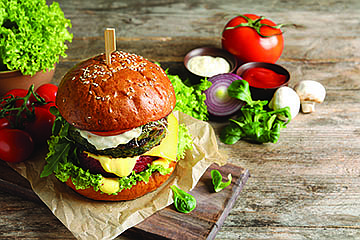It looks like a hamburger. It tastes like a hamburger. But it's not from a cow.
Meet the Impossible Burger. And the B4Burger. And the Awesome Burger. And the Beyond Burger. And the B12 Burger. And
Meat alternatives are dominating headlines - and the market. Sales have jumped 11% in the past year and 31% over the past two years. The plant-based food retail market now sits at almost $4.5 billion nationally, according to a report from The Good Food Institute, a nonprofit that supports plant-based meat providers.
And the number of faux meat providers is keeping pace with the trend. In August, Subway hooked up with Los Angeles-based Beyond Meat to create a meatless meatball that debuted in over 600 stores. In September, Kellogg announced a new line called Incogmeato that features plant-based burgers, "chik'n" nuggets and tenders that are more meatlike than those under its already popular vegan/vegetarian brand, Morningstar Farms. And, more recently, Nestle's Sweet Earth brand launched its own Awesome Burger.
The country's number of vegetarians, meanwhile, remains steady: roughly 5% of the population, according to a poll referenced in articles in both The Washington Post and Forbes last year.
So who exactly is wolfing down today's realistic meat alternatives? Everyone. It's about broadening the market from those who are vegan or vegetarian to those who consider themselves "flexitarians," a group of people who aren't fully cutting out animal products but are still enjoying meat alternatives, says Don Otis. He's the CEO of local manufacturer Heritage Health Food, whose parent company has been pioneering "meat analogs" since the late 1950s.
"When you look at the vegetarian plus the flexitarian community, they want the experience to throw it on their grill and cook it like a real burger," Otis says. "And we can finally do that with this new technology."
Beyond Meat has been around since 2009 with its Beyond Burger, dubbed the first plant-based burger that "looks, cooks and satisfies like beef without GMOs, soy or gluten," according to the company's website. Impossible Foods debuted its own take in 2011. But the big break came in 2016 when celebrity chef David Chang put that Impossible Burger on the menu at his New York City restaurant, Momofuku Nishi. Now, it's in over 10,000 restaurants and the company has deals with national chains.
Rather than the veggie patties of days past, today's meat alternatives rely on replicating what makes meat, well, meat. The Impossible Burger gets its meaty flavor from heme, an iron-containing molecule that moves oxygen - in this case, the hemoglobin found in soy rather than that in animal blood or the myoglobin in animals' muscles.
Worthington Foods has its own X-burger. It does not use heme, but a non-GMO pea protein and beets to achieve the look, smell and taste of ground beef. The burger will start to juice, or "bleed" the way a ground beef burger would on the grill, and that's when a cook knows its ready to eat.
"The world and the flexitarians are finally taking us seriously because it's not about not eating meat, it's about choosing a healthier lifestyle," says Otis, a lifelong vegetarian.
Foods labeled as vegan or vegetarian don't always guarantee a more healthful option. (Oreo cookies, chock full of processed ingredients, are technically vegan, after all.) But plant-based burgers seem to have some health advantage. According to the USDA, a beef burger has less protein and fiber than its pea- or soy-based counterparts, instead beefing up on fat.
Environmentally speaking, plant-based products have even more of an edge.
A 2018 report commissioned by Beyond Meat reports that a Beyond Burger generates 90% fewer greenhouse gas emissions, requires 46% less non-renewable energy and has 93% less impact on land use than a quarter pound of U.S. beef.
As with any trend, some question the longevity, but Otis says the faux meat market will only grow as larger companies jump into the mix.
"It's kind of a dog eat dog world right now because everybody is seeing the enormity of this space and opportunity," he says. "Millions and millions of dollars are being put behind it globally. It's your intellectual property that you're working on that can separate you from the rest of the world."
